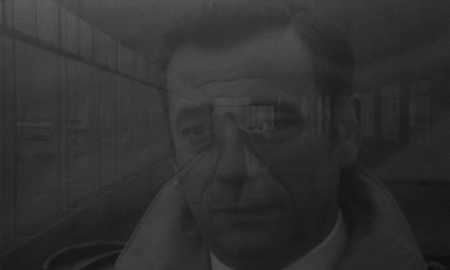Alain à la recherche #8: La guerre est finie
by Ryland Walker Knight

[The Resnais series playing at the PFA this November and December is part of a broader, traveling retrospective with a concurrent run in Chicago at the Gene Siskel Film Center and a proposed stop at the newly renovated Museum of the Moving Image in early 2010.]

Riddled with overlays of misinformation and suspicions, to say projections and reflections, that act as interpolations, La guerre est finie is close to a second person narrative, calling "you" in almost every scene, putting you into Yves Montand's cluttered head of dead ends. Before all, the title is past tense: this fight is already done. What remains are fantasies, ideals, while reality continues and refuses these so-called revolutionaries. Instead, we see a rootless man (Montand), essentially homeless and process-bound—always moving, shifting—not even tied to a name. He's Carlos to start, then Domingo (Dimanche/Sunday), then Diego and back. And when he's Diego, we gather that's his Christian prenom, he's not: he lies to his wife's friends, his wife tries to lie for him, but he can't keep things straight. In fact, despite his ability to bed the too-yummy-for-words Geneviève Bujold, the film is about his fade. Everything is not in its right place. The game is up. His war has been over, he's a hanger-on, like his fat and/or stubborn comrades—a relic, even, relevant no more. But nobody will listen when he says so, when he says things should stop; he gets stopped, and then not. The halt's not halting: even in the end it's a relay, an ill-conceived gamble that we know won't work because of that dissolve to Ingrid Thulin—so desperate, trying not to run—that just hangs there. You feel the "FIN" before it emerges. After all, you felt it at the start.





No comments:
Post a Comment